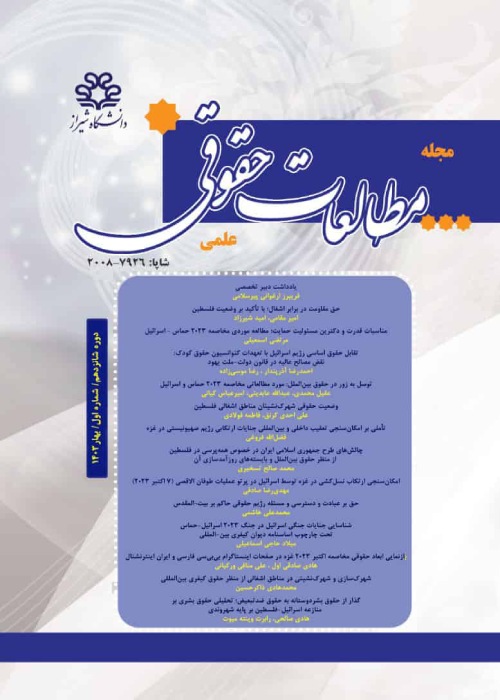The Iranian Plan on the Palestine Question: Challenges from International Law and Opportunities for Revision
The liberation of al-Quds has been a fundamental goal of the Islamic Revolution since the establishment of the Islamic government in Iran during the years following the uprising. Consequently, the Islamic Republic of Iran and its citizens have consistently endeavored to take steps in various dimensions to support this aspiration. The "National Referendum Plan in the Land of Palestine" is defined as a legal initiative in this regard, based on international law language and referencing international documents and legal terminology.
This plan or proposal, formulated based on international legal principles and utilizing a four-stage mechanism, seeks to provide a legal framework for the realization of the establishment of a Palestinian state, asserting the "right to self-determination" and formulating the legal rights of Palestinian refugees and displaced persons under the headings of "right of return." An analysis of the amalgamation of concepts and documents suggests that the language of the proposal is grounded in international law. The choice of this language can be attributed to the widespread adoption of the "international law" discourse.
The proposal, by asserting Iran's historical claim in supporting the resolution of the Palestinian Question by Palestinians, introduces the referendum as the optimal available option to end the current tense situation. Referendum, as a method for determining future leadership, is one of the most common approaches recognized initially in domestic law and subsequently in international law as a "legitimate" method for the establishment of a country or government.
This article addresses the fundamental issue of the challenges faced by the Iranian proposal from the standpoint of international law and examines the subjects that warrant attention for its revision and enhancement. Employing an analytical and descriptive approach, the paper delves into the challenges and imperatives for reconsideration in the aforementioned proposal.
The primary challenge that the proposal has insufficiently addressed is the concept of "the two-state solution." This idea, considered a rival theory to the Iranian resolution of the Palestinian Question, has gained acceptance and dissemination by governments and international organizations at large. The proposal should articulate the reasons for deviating from alternative solutions, both legally and practically, while elucidating its own concept. The notion of establishing two states conflicts with various aspects of international law, such as opposition to the right to self-determination, right to land and territory, division without legal basis, division without competence based on the United Nations Charter, disregard for actions conflicting with the subject and goals of agreements by the Israeli party.
Furthermore, recent public sentiments regarding the acceptance of the two-state solution among the Palestinian and Israeli populations highlight the fact that individuals involved in this proposal on both sides lack belief or hope in the reality and operational feasibility of this idea. The article aims to shed light on these challenges and considerations for the revision of the Iranian proposal in a comprehensive and insightful manner.
Iran plan systematically avoids addressing the Palestinian Liberation Organization (PLO), currently holding the official government of Palestine, despite the indispensable need to consider recognized international legal structures to advance solutions for the Palestinian predicament. It appears that the Iranian proposal must contemplate a mechanism involving the collective participation of Palestinian organizations.
The utilization of international legal terms without equivalents (such as national referendum and genuine Palestinian) or with vague interpretations (occupation) constitutes the third legal challenge of the Iranian proposal. Iran considers all Palestinian territories as belonging to the Palestinian people, describing Israel's presence anywhere on this land as an "occupation." However, the term "occupied territories" in international law literature and the documentation of various governments refers to Israel's presence beyond the boundaries defined in the partition plan known as the 1967 borders.
Despite possessing all the legal strengths, like all international proposals, the Iranian plan necessitates a revised and enhanced version. It is indisputable that the issue of Palestine, in addition to its international legal dimensions, encompasses various political, economic, military, and social arenas, as acknowledged by the author. Therefore, rewriting the proposal, while acknowledging non-legal realities, remains imperative from an international legal perspective.
This article suggests that Iran, in its plan revision, should move towards garnering public consensus and conveying the Iranian proposal to the collective endorsement of governments sympathetic to the Palestinian cause. This approach is reinforced by Iran's repeated declarations, in various General Assembly resolutions, expressing disagreement with certain clauses while overall supporting the Palestinian side.
Furthermore, given that the International Court of Justice, the International Criminal Court, and international human rights mechanisms are poised for extensive actions concerning Palestinian issues, the new Iranian proposal must draw on legal literature shaped by these judicial and international human rights developments. The International Court of Justice has been requested for the third time regarding the "Situation of Israel's Actions in Occupied Territories (After 1967)" in advisory opinion, with the verdict on the verge of issuance. Additionally, South Africa, a party to the Convention on the Prevention of Genocide, has initiated litigation concerning the occurrence of genocide by Israel during the October War.
- حق عضویت دریافتی صرف حمایت از نشریات عضو و نگهداری، تکمیل و توسعه مگیران میشود.
- پرداخت حق اشتراک و دانلود مقالات اجازه بازنشر آن در سایر رسانههای چاپی و دیجیتال را به کاربر نمیدهد.


